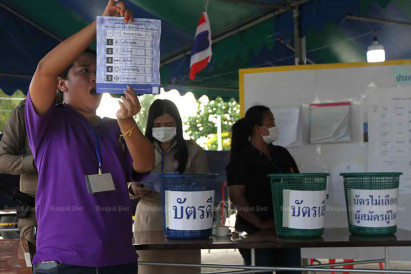EC has ‘Plan B’ for MP tally calculation

The election timeline is unlikely to be affected by the Constitutional Court’s ruling on the Election Commission’s calculation of the number of people represented by each MP, according to Deputy Prime Minister Wissanu Krea-ngam.
The court has accepted for a ruling the Election Commission (EC)’s petition on whether non-Thai citizens can be included in the formula to calculate the number of people represented by each MP.
The court is scheduled to hand down a ruling on March 3, and if it orders the EC to recalculate, the number of constituency MPs in several provinces is expected to change. This will also have an impact on the number of seats each party could win in the next election.
Mr Wissanu said the ruling is unlikely to affect the election timeline and the commission has a Plan B if the court rules against it.
“The EC has a plan for every scenario. If the court accepts its calculation method, it goes with the first plan. If it doesn’t, the EC uses another. Everything is within its poll timeline,” he said.
Prime Minister Prayut Chan-o-cha said Tuesday he would dissolve the House early next month so the general election can take place on May 7 and state agencies can press ahead with their work ahead of polling day.
Mr Wissanu said he had no idea whether Gen Prayut will announce the House dissolution on March 3 in case the court hands down a ruling that day, adding the premier is expected to discuss it with coalition partners.
He said a decree dissolving the House does not require the cabinet’s consideration, adding the government’s team of spokespeople will provide details about the role of the caretaker government.
“When the House is dissolved, this will be determined by the prime minister. He said he will discuss the issue with coalition partners again as he has to wait for the EC, which is awaiting the court’s ruling,” Mr Wissanu said.
Mr Wissanu said a caretaker cabinet will still meet every Tuesday after the House is dissolved, and the caretaker prime minister still has the power to reshuffle the cabinet.
According to a source, the court can approve the current calculation method or reject it, forcing the EC to recalculate.
With the EC’s current calculation, three groups of non-Thais are included in the population database, which it uses as a guide for the redrawing of constituency boundaries.
However, critics have spoken out against the formula, saying non-Thais are not eligible to vote so should be excluded from the calculation. They suggested the matter be referred to the court.
If the EC has to recalculate, the number of constituency MPs in eight provinces is expected to change.
Tak, Chiang Rai, Chiang Mai and Samut Sakhon will have fewer MPs while Udon Thani, Lop Buri, Nakhon Si Thammarat and Pattani will be allocated more.
Meanwhile, military leaders have pledged political neutrality and will provide support to the EC to ensure a smooth election, according to the Royal Thai Armed Forces (RTARF).
RTARF spokesman Lt Gen Thirapong Pattamasingh na Ayutthaya said parties and their candidates will be given opportunities to hold campaign rallies on military bases in line with EC and military regulations.
He said the military will work closely with police and civilian officials in providing security and safety to people during the elections.
In other election news, the Pheu Thai Party on Wednesday called on the EC to share the unofficial results of the election in real-time to ensure transparency in response to the EC’s revised regulation, whereby the EC would not report unofficial results.
Taking issue with that, Pheu Thai said the EC should inform the public of unofficial results in real-time after the vote count at polling stations as they are essential for fair and clean elections.
According to Pheu Thai, the EC should address what caused the incorrect reporting of initial election results in previous polls instead of scrapping real-time updates.

